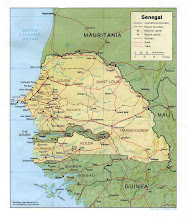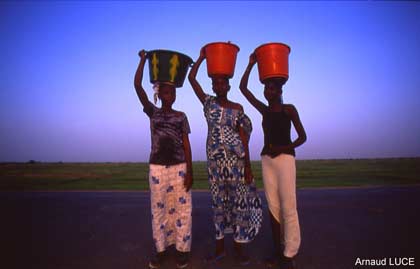Thursday, September 20, 2012
IMF outlook guarded optimistic
The latest IMF report for Senegal contains positive comments on the near term and some optimism for the medium term. Here is the heart of todays release on the early September IMF mission:
“Despite the gloomy international context, GDP growth is expected to increase slightly to 4.3 percent in 2013, sustained primarily by major projects coming to fruition in the electricity and road sectors, the continued recovery of the agricultural sector, implementation of the heavy metals project (zircon) in Grande Côte, gold mining projects in Golouma and Massawa, and the startup of projects financed by the Millennium Challenge Account. Inflation is expected to remain contained at about 2 percent in 2013. The current account deficit should decline, but would remain high in light of imports associated with investments in the energy and mining sectors. The overall balance of payments is expected to post a slight deficit.
“In the medium term, the key challenge for Senegal is to return to strong, sustainable, shared growth. The government has an important role to play in the process, for instance, through the development of essential infrastructure, reforms to improve the business climate, and appropriate social policies. Reconciling the objectives of meeting the country's development needs and maintaining a sustainable debt position calls for greater efficiency in public spending."
Friday, July 13, 2012
IMF: tough times for new administration
The International Monetary Fund's press release today on Senegal's policy review predicted rough weather ahead for the country's new ruling administration under President Macky Sall.
According to the statement of IMF deputy director Min Zhu, Senegal's economy “slowed down ahead of the elections, and economic performance was affected by exogenous shocks, including the drought in the Sahel. Growth is expected to resume in 2012, but a weak global environment and regional instability pose important challenges.
“A higher deficit target in 2012 (6.4 percent of GDP) accommodates the impact of exogenous factors, but significant efforts are required to keep the program on track. The authorities’ plans to reduce the cost of running the government and postpone non-priority investment projects are crucial to meeting the deficit target. Over the medium term, the authorities are committed to reducing the fiscal deficit below 5 percent of GDP in 2013 and 4 percent by 2015 to keep public debt on a sustainable path and rebuild fiscal buffers. The authorities’ intention to replace costly general price subsidies, particularly for energy, with an alternative system better targeting the poor is an important step.
“The program’s ambitious structural reform agenda is critical to raising Senegal’s long-term growth potential. Comprehensive tax reform and reform of the energy sector should remain key objectives for 2012. Other priority reform areas include public financial and debt management, tax and customs administration, the financial sector, and measures aimed at removing bottlenecks to growth and improving the business climate and governance,” Mr. Zhu added.
Wednesday, May 16, 2012
IMF: drought drags down GDP
According to the recent IMF mission report on Senegal's economic progress, much gain has been made. But drought conditions brought down harvests, and with that overall economic vitality of Senegal. According to the May 15 report:
"Macroeconomic developments in 2011 were less positive than expected because of the drought in the Sahel region. The steep decline of agricultural production despite sound results in the other sectors of economic activity has limited GDP growth to 2.6 percent. Inflation stood at 3.4 percent in 2011, driven by the increase of food and transport prices, in a context of rising global commodity prices."
Check out the Café Touba at Cassicafe.com.
Saturday, February 18, 2012
Presidential election and the rule of law
This weekend's presidential elections, scented with teargas, a delicate dance between the mob and self-determination, give real meaning to the rule of law--or its lack. At this juncture in the history of Senegal, here is the latest ranking of the county by the Rule of Law Index prepared by the World Justice Project:
"Within its income group, Senegal is in the middle of the rankings in most dimensions. Government accountability is weak, with particular concerns regarding the proper functioning of checks and balances on the executive branch (ranking 51st among the 66 countries in the sample and 11th out of 16 lower-middle income countries). Another area where efforts are required is open government, where the country ranks 62nd. The country has a moderate record in protecting fundamental rights (ranking 38th overall and 3rd among the Indexed countries in Sub-Saharan Africa), although police abuses and harsh treatment of prisoners remain a source of concern."
This is not the last word on Senegal's democracy, nor will be the elections this weekend. We will see how it plays out.
"Within its income group, Senegal is in the middle of the rankings in most dimensions. Government accountability is weak, with particular concerns regarding the proper functioning of checks and balances on the executive branch (ranking 51st among the 66 countries in the sample and 11th out of 16 lower-middle income countries). Another area where efforts are required is open government, where the country ranks 62nd. The country has a moderate record in protecting fundamental rights (ranking 38th overall and 3rd among the Indexed countries in Sub-Saharan Africa), although police abuses and harsh treatment of prisoners remain a source of concern."
This is not the last word on Senegal's democracy, nor will be the elections this weekend. We will see how it plays out.
Subscribe to:
Comments (Atom)


